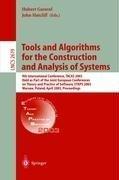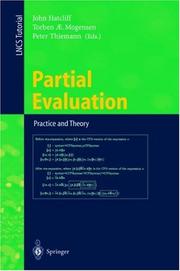| Listing 1 - 7 of 7 |
Sort by
|
Multi
ISBN: 9783642134647 9783642134630 9783642134654 Year: 2010 Publisher: Berlin, Heidelberg Springer
Abstract | Keywords | Export | Availability | Bookmark
 Loading...
Loading...Choose an application
- Reference Manager
- EndNote
- RefWorks (Direct export to RefWorks)
In 2010 the internationalfederated conferenceson Distributed Computing Te- niques (DisCoTec) tookplacein Amsterdam,during June 7-9.It washosted and organized by the Centrum voor Wiskunde & Informatica. DisCoTec conferences jointly cover the complete spectrum of distributed computing subjects ranging from theoretical foundations to formal speci?- tion techniques to practical considerations. The 12th International Conference on Coordination Models and Languages (Coordination) focused on the design and implementation of models that allow compositional construction of lar- scale concurrent and distributed systems, including both practical and foun- tionalmodels,run-timesystems,andrelatedveri?cationandanalysistechniques. The 10th IFIP International Conference on Distributed Applications and Int- operable Systems in particular elicited contributions on architectures, models, technologies and platforms for large-scale and complex distributed applications and services that are related to the latest trends in bridging the physical/virtual worlds based on ?exible and versatile service architectures and platforms. The 12th Formal Methods for Open Object-Based Distributed Systems and 30th FormalTechniques for NetworkedandDistributed Systems together emphasized distributed computing models and formal speci?cation, testing and veri?cation methods.
Mathematical logic --- Logic --- Computer science --- Programming --- Computer architecture. Operating systems --- Computer. Automation --- computers --- programmeren (informatica) --- programmeertalen --- wiskunde --- software engineering --- logica --- computernetwerken
Book
ISBN: 9783642134647 9783642134630 9783642134654 Year: 2010 Publisher: Berlin Heidelberg Springer Berlin Heidelberg
Abstract | Keywords | Export | Availability | Bookmark
 Loading...
Loading...Choose an application
- Reference Manager
- EndNote
- RefWorks (Direct export to RefWorks)
In 2010 the internationalfederated conferenceson Distributed Computing Te- niques (DisCoTec) tookplacein Amsterdam,during June 7-9.It washosted and organized by the Centrum voor Wiskunde & Informatica. DisCoTec conferences jointly cover the complete spectrum of distributed computing subjects ranging from theoretical foundations to formal speci?- tion techniques to practical considerations. The 12th International Conference on Coordination Models and Languages (Coordination) focused on the design and implementation of models that allow compositional construction of lar- scale concurrent and distributed systems, including both practical and foun- tionalmodels,run-timesystems,andrelatedveri?cationandanalysistechniques. The 10th IFIP International Conference on Distributed Applications and Int- operable Systems in particular elicited contributions on architectures, models, technologies and platforms for large-scale and complex distributed applications and services that are related to the latest trends in bridging the physical/virtual worlds based on ?exible and versatile service architectures and platforms. The 12th Formal Methods for Open Object-Based Distributed Systems and 30th FormalTechniques for NetworkedandDistributed Systems together emphasized distributed computing models and formal speci?cation, testing and veri?cation methods.
Mathematical logic --- Logic --- Computer science --- Programming --- Computer architecture. Operating systems --- Computer. Automation --- computers --- programmeren (informatica) --- programmeertalen --- wiskunde --- software engineering --- logica --- computernetwerken

ISBN: 3540008985 354036577X Year: 2003 Volume: 2619 Publisher: Berlin, Heidelberg : Springer Berlin Heidelberg : Imprint: Springer,
Abstract | Keywords | Export | Availability | Bookmark
 Loading...
Loading...Choose an application
- Reference Manager
- EndNote
- RefWorks (Direct export to RefWorks)
System design --- Computer software --- Systèmes, Conception de --- Logiciels --- Congresses --- Development --- Congrès --- Développement --- Computer Science --- Engineering & Applied Sciences --- Systèmes, Conception de --- Congrès --- Développement --- Computer science. --- Computer communication systems. --- Software engineering. --- Computers. --- Algorithms. --- Computer logic. --- Computer Science. --- Theory of Computation. --- Software Engineering/Programming and Operating Systems. --- Logics and Meanings of Programs. --- Computer Communication Networks. --- Software Engineering. --- Algorithm Analysis and Problem Complexity. --- Information theory. --- Logic design. --- Computer software. --- Software, Computer --- Computer systems --- Design, Logic --- Design of logic systems --- Digital electronics --- Electronic circuit design --- Logic circuits --- Machine theory --- Switching theory --- Computer software engineering --- Engineering --- Communication theory --- Communication --- Cybernetics --- Algorism --- Algebra --- Arithmetic --- Communication systems, Computer --- Computer communication systems --- Data networks, Computer --- ECNs (Electronic communication networks) --- Electronic communication networks --- Networks, Computer --- Teleprocessing networks --- Data transmission systems --- Digital communications --- Electronic systems --- Information networks --- Telecommunication --- Cyberinfrastructure --- Electronic data processing --- Network computers --- Computer science logic --- Logic, Symbolic and mathematical --- Automatic computers --- Automatic data processors --- Computer hardware --- Computing machines (Computers) --- Electronic brains --- Electronic calculating-machines --- Electronic computers --- Hardware, Computer --- Calculators --- Cyberspace --- Foundations --- Distributed processing --- Congresses. --- Computer networks.
Book
ISBN: 1595939776 Year: 2008 Publisher: ACM
Abstract | Keywords | Export | Availability | Bookmark
 Loading...
Loading...Choose an application
- Reference Manager
- EndNote
- RefWorks (Direct export to RefWorks)
Book
ISBN: 3642134637 9786613564849 3642134645 1280386924 Year: 2010 Publisher: New York : Springer,
Abstract | Keywords | Export | Availability | Bookmark
 Loading...
Loading...Choose an application
- Reference Manager
- EndNote
- RefWorks (Direct export to RefWorks)
Electronic data processing --- Object-oriented programming (Computer science) --- Formal methods (Computer science) --- Engineering & Applied Sciences --- Electrical & Computer Engineering --- Computer Science --- Telecommunications --- Distributed processing --- Information Technology --- Computer Science (Hardware & Networks) --- Computer science. --- Computer communication systems. --- Computer programming. --- Software engineering. --- Programming languages (Electronic computers). --- Computer logic. --- Mathematical logic. --- Computer Science. --- Computer Communication Networks. --- Programming Techniques. --- Software Engineering. --- Programming Languages, Compilers, Interpreters. --- Logics and Meanings of Programs. --- Mathematical Logic and Formal Languages. --- Algebra of logic --- Logic, Universal --- Mathematical logic --- Symbolic and mathematical logic --- Symbolic logic --- Mathematics --- Algebra, Abstract --- Metamathematics --- Set theory --- Syllogism --- Computer science logic --- Logic, Symbolic and mathematical --- Computer languages --- Computer program languages --- Computer programming languages --- Machine language --- Languages, Artificial --- Computer software engineering --- Engineering --- Computers --- Electronic computer programming --- Electronic digital computers --- Programming (Electronic computers) --- Coding theory --- Communication systems, Computer --- Computer communication systems --- Data networks, Computer --- ECNs (Electronic communication networks) --- Electronic communication networks --- Networks, Computer --- Teleprocessing networks --- Data transmission systems --- Digital communications --- Electronic systems --- Information networks --- Telecommunication --- Cyberinfrastructure --- Network computers --- Informatics --- Science --- Programming --- Logic design. --- Design, Logic --- Design of logic systems --- Digital electronics --- Electronic circuit design --- Logic circuits --- Machine theory --- Switching theory --- Amsterdam <2010>

ISBN: 3540667105 9783540667100 9786610956531 1280956534 3540470182 Year: 1999 Volume: 1706 Publisher: Berlin: Springer,
Abstract | Keywords | Export | Availability | Bookmark
 Loading...
Loading...Choose an application
- Reference Manager
- EndNote
- RefWorks (Direct export to RefWorks)
As the complexity of software increases, researchers and practicioners continue to seek better techniques for engineering the construction of evolution of software. Partial evaluation is an attractive technology for modern software construction since it provides automatic tools for software specialization and is based on rigorous semantic foundations. This book is based on a school held at DIKU Copenhagen, Denmark in summer 1998 during which leading researchers summarized the state of the art in partial evaluation. The lectures presented survey the foundations of partial evaluation in a clear and rigorous manner and practically introduce several existing partial evaluators with numerous examples. The second part of the book is devoted to more sophisticated theoretical aspects, advances systems and applications, and highlights open problems and challenges. The book is ideally suited for advanced courses and for self study.
Computer software --- -681.3*D12 --- 681.3*D2 --- 681.3*D31 --- 681.3*D34 --- 681.3*F3 --- 681.3*F3 Logics and meanings of programs (Theory of computation) --- Logics and meanings of programs (Theory of computation) --- 681.3*D34 Processors: code generation compilers interpreters optimization parsing preprocessors run-time environments translator writing systems and compilergenerators (Programming languages) --- Processors: code generation compilers interpreters optimization parsing preprocessors run-time environments translator writing systems and compilergenerators (Programming languages) --- 681.3*D31 Formal definitions and theory: semantics syntax (Programming languages)--See also {681.3*D21} {681.3*F31} {681.3*F32} {681.3*F42} {681.3*F43} --- Formal definitions and theory: semantics syntax (Programming languages)--See also {681.3*D21} {681.3*F31} {681.3*F32} {681.3*F42} {681.3*F43} --- 681.3*D2 Software engineering: protection mechanisms standards--See also {681.3*K63} {681.3*K51} --- Software engineering: protection mechanisms standards--See also {681.3*K63} {681.3*K51} --- 681.3*D12 Automatic programming--See also {681.3*I22} --- Automatic programming--See also {681.3*I22} --- Software, Computer --- Computer systems --- Evaluation --- Evaluation. --- Computer software -- Evaluation. --- Computer systems -- Evaluation. --- ADP systems (Computer systems) --- Computing systems --- Systems, Computer --- Computer science. --- Software engineering. --- Computer programming. --- Programming languages (Electronic computers). --- Computer Science. --- Software Engineering/Programming and Operating Systems. --- Programming Languages, Compilers, Interpreters. --- Programming Techniques. --- 681.3*D34 Processors: code generation; compilers; interpreters; optimization; parsing; preprocessors; run-time environments; translator writing systems and compilergenerators (Programming languages) --- Processors: code generation; compilers; interpreters; optimization; parsing; preprocessors; run-time environments; translator writing systems and compilergenerators (Programming languages) --- 681.3*D31 Formal definitions and theory: semantics; syntax (Programming languages)--See also {681.3*D21}; {681.3*F31}; {681.3*F32}; {681.3*F42}; {681.3*F43} --- Formal definitions and theory: semantics; syntax (Programming languages)--See also {681.3*D21}; {681.3*F31}; {681.3*F32}; {681.3*F42}; {681.3*F43} --- 681.3*D2 Software engineering: protection mechanisms; standards--See also {681.3*K63}; {681.3*K51} --- Software engineering: protection mechanisms; standards--See also {681.3*K63}; {681.3*K51} --- Computer languages --- Computer program languages --- Computer programming languages --- Machine language --- Electronic data processing --- Languages, Artificial --- Computers --- Electronic computer programming --- Electronic digital computers --- Programming (Electronic computers) --- Coding theory --- Computer software engineering --- Engineering --- Informatics --- Science --- Programming --- Electronic systems --- Cyberinfrastructure --- Computer software - Evaluation --- -Evaluation
Book
Year: 2008 Publisher: Association for Computing Machinery
Abstract | Keywords | Export | Availability | Bookmark
 Loading...
Loading...Choose an application
- Reference Manager
- EndNote
- RefWorks (Direct export to RefWorks)
| Listing 1 - 7 of 7 |
Sort by
|

 Search
Search Feedback
Feedback About UniCat
About UniCat  Help
Help News
News